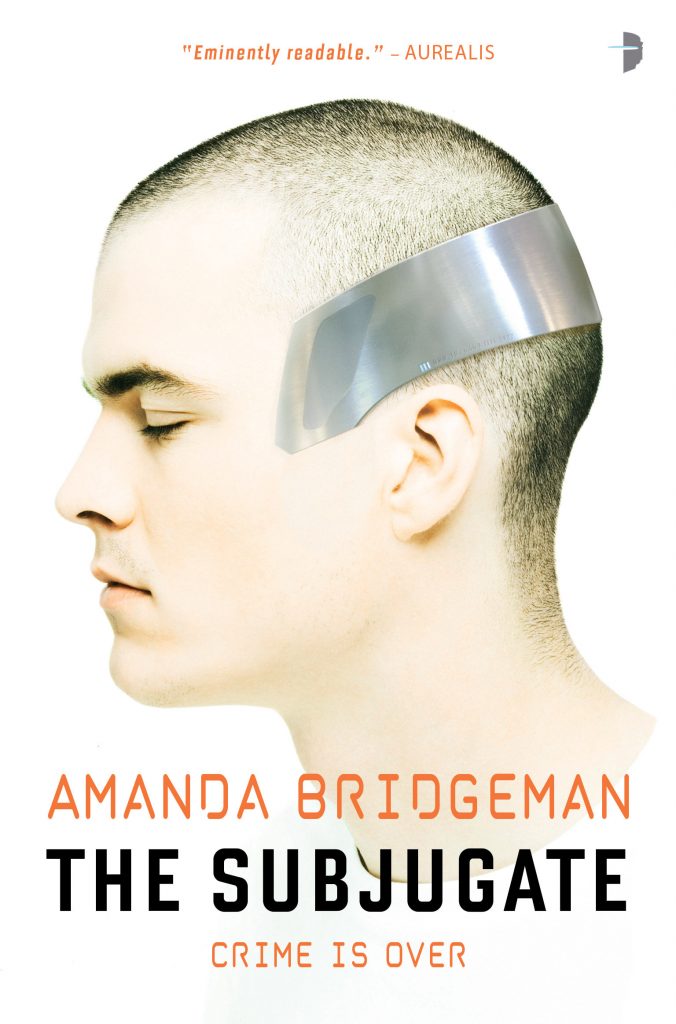Hello Robots! Amanda Bridgeman here, putting forward my thoughts on the possibility of curing crime.
In my novel, The Subjugate, I explore a somewhat utopian idea of curing criminals from re-offense. At least, curing those who would inflict physical harm upon another human being. It may seem like a far-off dream to some, but the truth is, it may not be as far from reality as we think.

Around the world, advancements in neuroscience have resulted in many medical conditions such as epilepsy and Parkinson’s being better understood and treated. The brains of patients are being mapped, the affected areas identified, the triggers discovered, and intervention prescribed through medication or the use of certain neurological devices – such as those being trialed in patients with Parkinson’s disease to reduce their tremors.
With our increased understanding of the human brain and the growing technology available, various studies are also being undertaken to understand things like mental illness and certain human behaviors such as addiction and violence/aggression. Through the various studies, neuroscientists are coming to understand how the brain reacts when someone is happy or sad, when they are aroused, or when someone is angry, etc. And through the process of ‘neuroprediction’, they are attempting to identify individuals who may be prone to certain behavior due to the particular ‘wiring’ of their brain.
While neuroscience is still in its infancy, of particular relevance to The Subjugate are the studies relating to criminal behavior. One small study found a potential link between low activity in the impulse control center of the brain with increased criminal re-offense rates. Another study identified a genetic variant of a particular gene that correlates to an increased risk of violent behavior. Not everyone with this gene will act violently, of course, and there are often other influential circumstances at play, such as socio-economic factors, the cycle of abuse, etc. But just think, if neuroscientists can map the brains of violent criminals and identify certain abnormal structures or reactive patterns, they could potentially identify ways to ‘cure’ that criminal and stop them from reoffending. Or better still, they might identify a potential criminal before they even commit a crime.
In The Subjugate I explore a near future world where the criminal re-offence behavior of murderers, rapists and pedophiles is being controlled through neurological devices that keep certain impulses under control. I examine the ethical debate of their treatment and of releasing these ‘cured’ violent criminals back onto the streets, all the while my protagonist, Detective Salvi Brentt, investigates a series of murders.
Arguments already abound about ‘neurolaw’ – using neuroscience to help convict or clear those charged with certain crimes. For example, how addiction changes the brain and if that constitutes whether someone was in control of their actions at the time of their offense. And while some decry using neuroscience in criminal law, others are calling for neuroscientists to be more involved. Some are even questioning whether neuroscience will eventually take the place of criminal law. Imagine a world where cold, hard science determines your guilt and your punishment/cure, instead of the merits of a lawyer’s argument.
For now, in real life, we continue to attempt to fight crime and re-offense rates with education and counselling, skills training and improving the current state of incarceration to be more psychologically beneficial to prisoners (such as getting rid of solitary confinement which has been proven to be detrimental to an inmate’s mental health). But while the current system does what it can, neuroscientists will continue to work in the background to help us better understand criminal behavior and perhaps help us find ways to reduce it permanently. And maybe one day stories like The Subjugate won’t be science fiction anymore, but instead science fact.
Piqued your interest? Why not buy the book – Angry Robot | Amazon UK | Amazon USA | WHSmiths | Barnes & Noble

Amanda Bridgeman is an Aurealis Award finalist and author of 7 science fiction novels, including the best-selling space opera Aurora series and apocalyptic drama The Time of the Stripes. She studied film & television/creative writing at Murdoch University, earning her a BA in Communication Studies. Perth has been her home ever since, aside from a nineteen-month stint in the UK where she dabbled in film & TV extras work.
© 2024 – Angry Robot/Watkins Media Ltd.
Angry Robot and the Angry Robot icon are registered trademarks of Watkins Media Ltd.
Company Registration Number: 9171151. Company Registered Address: Shepperton House Unit 11, 89 Shepperton Road, London, England, N1 3DF
You may also like
Announcing Lessons in Birdwatching
Announcing THE BONE ROOTS by Gabriela Houston
MYRIAD by Joshua David Bellin, publishing May 2023!
Open Submissions 2024 Update: 15th April 2024
Angry Robot Open Submission’s Period 2024
Storywise and Open Submissions FAQ’s
Angry Robot Books – For Your Consideration…
Ledge Readalong: Chapters 46 – 52
Ledge Readalong: Chapters 38 – 45
Ledge Readalong: Chapters 30 – 37
Ledge Readalong: Chapters 23 – 29
Ledge Readalong: Chapters 16 -22
Ledge Readalong: Chapters 9 -15